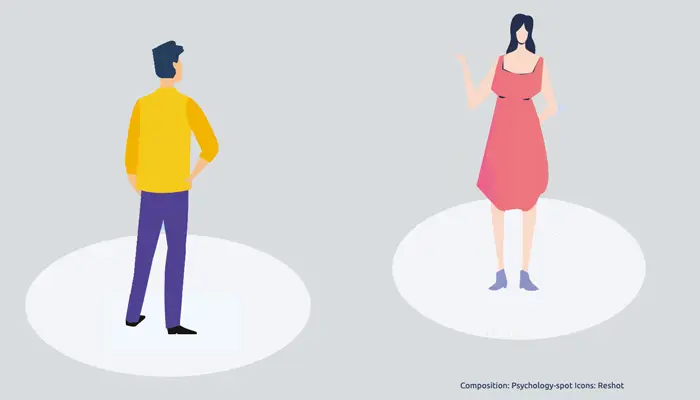
Assessing the quality of a relationship is not easy. When emotions are involved, it is difficult to analyze what is happening in an objective way. As a result, many people end up “trapped” in relationships that, far from satisfying their emotional needs and helping them to be the best version of themselves, bring out their worst side.
For this reason, when analyzing the quality of a romantic relationship, it is important to ask ourselves if it is really helping us to be a better person, if it encourages us to grow, develop new interests and develop our best part.
Personal growth as a couple through the expansion of the “self”
We are solely responsible for our development. On our shoulders rests the responsibility of developing new skills and interests. Search for new experiences that expand our vision of the world. Learn new things. Facing challenges and setting new goals that allow us to get out of the comfort zone. Fall down and get up. Know our deficiencies and work every day to overcome them. We are, in short, the most responsible for our growth and we cannot leave it in the hands of anyone else.
However, we do not live with our backs to the world. The people around us, especially those with whom we share our lives, such as our partner, also have an impact on this growth process. Toxic people often become a hindrance to growth. Manipulation, self-centeredness or pessimism end up making a dent in us. After all, the fears, insecurities and paranoia of others are also contagious.
In fact, a study carried out at the University of Chicago revealed that, in stable relationships over time, it is common for the self-concepts of each member to intermingle. That fusion encourages people to accept, share, and take on each other’s characteristics, quirks, interests, and abilities – up to a point, obviously.
These psychologists refer to the principle of self-expansion, which allows each member of the relationship to expand their “self” by experiencing the characteristics, perspectives, and identity of the other. In this way, mutual growth occurs, although each one maintains their own identity, obviously.
For example, if our partner has a stronger sense of humor than we do, ours is likely to improve over time. If we have more emotional self-control, theirs is likely to improve as well. Also, the different points of view of the partner on political, religious, social or food issues will influence the other, hopefully broadening their perspective and helping them develop a more complex and global vision on these issues.
This two-way feedback facilitates growth as a couple, it helps us become better people. More mature people who strive to develop the different aspects of their personality and exploit their full potential. It is also beneficial for the couple. It has been proven that couples with higher levels of self-expansion have better relationships. Not only do they feel more love, but they are also more satisfied and committed to the relationship, have less conflict, and are happier with their sex lives.
On the other hand, when a relationship does not allow its members to grow, they can feel trapped. This discomfort generates dissatisfaction, leads to boredom and creates an emotional vacuum, which increases the chances that the relationship will break. When the couple relationship limits one of its members – or both – it ends up being castrating. Its members not only fail to fully develop, but often show their worst version by adopting possessive or submissive, manipulative, aggressive or intolerant attitudes. In these cases, a spiritual growth as a couple does not take place, but rather an involution.
How to know if you have a developer relationship?
Realizing that a relationship is not going the right way, but that it limits our potential, is not always easy. For this reason, psychologist Gary W. Lewandowski created ten questions that we should answer honestly to analyze growth as a couple:
1. Does being with your partner allow you to live new experiences?
2. Does your partner stimulate your ability to set yourself and achieve new goals?
3. Does being in the company of your partner increase your level of consciousness?
4. Does your partner help you expand the image you have of yourself?
5. Do you notice that your partner tries to expand your capabilities?
6. Do your partner’s strengths as a person make up for some of your weaknesses?
7. Does your partner help you to have a broader perspective of things?
8. Does your partner increase your knowledge?
9. Has being with your partner helped you learn new things?
10. Has knowing your partner made you a better person?
Falling in love is great and spending time with our partner it can be pleasant, but the benefits of love must go further, they must be deeper and be reflected in our personal development. In this sense, a study carried out at Northwestern University discovered that the new generations have very high expectations about their relationship.
Those expectations become a double-edged sword when we think that our partner should satisfy our idiosyncratic needs and self-expression. In this way, we blame the other for our shortcomings and increase the chances of feeling dissatisfied in the relationship and that it breaks up. On the other hand, that same study found that if both strive to be the best version of themselves and help the other grow, the relationship is strengthened and personal growth occurs as a couple.
The conclusions are clear: we are responsible for our personal growth, but we must also ensure that our relationships support it. In turn, we must become people who add value to others and enrich their lives and vision of the world. That is the way to encourage growth as a couple.
Sources:
Lewandowski, G. (2022) Is Your Relationship Making You a Better Person? En: Psychology Today.
Branand, B. et. Al. (2019) Pair-Bonding as Inclusion of Other in the Self: A Literature Review. Front. Psychol: 10.3389.
Finkel, E. J. et. Al. (2015) The Suffocation Model: Why Marriage in America Is Becoming an All-or-Nothing Institution. Current Directions in Psychological Science; 24(3): 238-244.
Aron, A. et. Al (2013) The Self-Expansion Model of Motivation and Cognition in Close Relationships. The Oxford Handbook of Close Relationships: 10.1093.



